How the ‘Stand Out: An LGBTQ+ Celebration’ Special Honors “Fearless” Comedians
- Oops!Something went wrong.Please try again later.
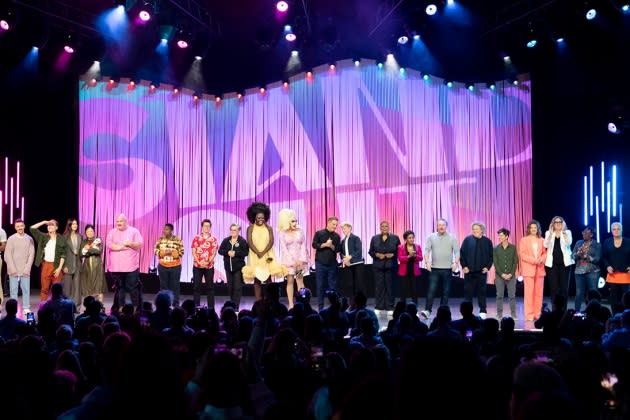
Page Hurwitz had a plan to tell the story of LGBTQ+ comedians with the help of one big historic show — and then the pandemic hit.
But as the global shuttering put a pause on her original plans, it opened the door for an invitation to the Netflix Is a Joke festival, where the director, writer, producer and comedian’s planned show — a featured part of Stand Out: The Documentary, which will debut on Netflix later this year — was able to be part of the streamer’s first major live comedy festival.
More from The Hollywood Reporter
Hosted by Billy Eichner and headlined by Eddie Izzard, Margaret Cho, Sandra Bernhard, Tig Notaro, Wanda Sykes and Rosie O’Donnell, the show is the largest known amassing of LGBTQ+ comedic talent on one stage. The sold-out three-hour set, held at the 5,900-capacity outdoor Greek Theatre, featured Billy Porter, Lena Waithe, Sarah Paulson, Stephen Fry, Fortune Feimster, Solomon Georgio, Sam Jay, River Butcher, Patti Harrison, Matteo Lane, Marsha Warfield, Mae Martin, Judy Gold, Joel Kim Booster, James Adomian, Guy Branum, Gina Yashere, Bob the Drag Queen, Trixie Mattel, Scott Thompson and Todd Glass among its lineup of comedians and presenters.
Condensed into a 90-minute variety special called Stand Out: An LGBTQ+ Celebration, released June 9, the night tackled topics from the political to casual, with Eichner among several comedians making pointed references to both anti-LGBTQ+ legislation and transphobia within comedy. “We all know how backward and dangerous the ‘Don’t Say Gay’ laws are. Queer people, and especially trans people, are under legislative attack in this country,” Eichner said in his opening for Stand Out. “Trans people are being demeaned. They’re trying to dehumanize trans people. They’re trying to erase trans people. And I’m not even talking about Florida. I’m talking about Dave Chappelle’s latest Netflix special!”
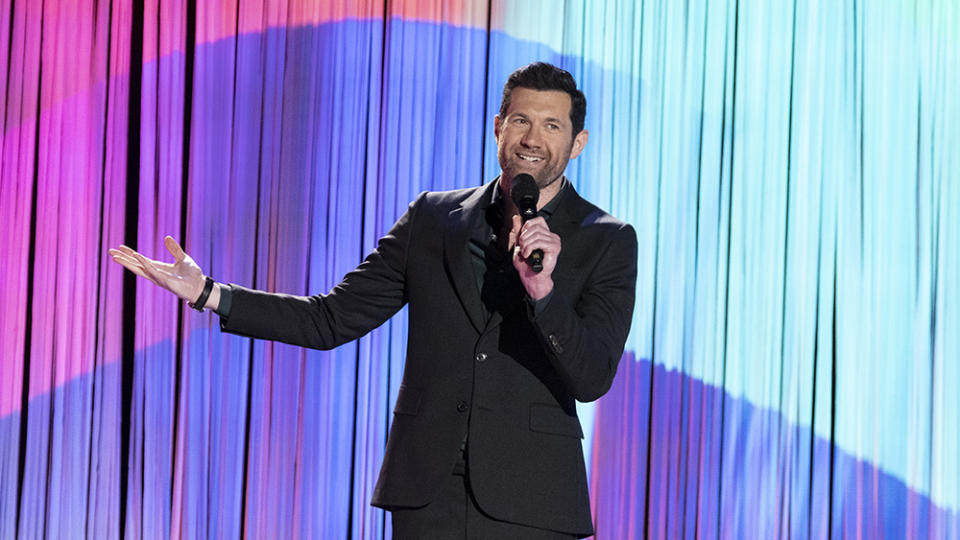
Beth Dubber/Netflix
The night and some of its jokes will also now live on in a slightly different form for the Hurwitz-written and directed feature-length project. A combination of original performances, poignant and funny interviews, archival materials and backstage vérité footage, Stand Out: The Documentary will explore — with much of the same talent present for the variety show — comedy as activism, diversity in stand-up, new queer culture and mainstreaming the alternative over the past five decades.
Following the Stand Out: An LGBTQ+ Celebration variety special’s release, Hurwitz spoke to The Hollywood Reporter about how the show will fit into the doc, how she amassed all that comedic talent and what makes the discussions about stage attacks in comedy different for LGBTQ+ comedians.
How did this become a part of the Netflix Is a Joke festival?
It actually had a different path than all the other shows. Originally, I pitched a documentary to Netflix on the history of queer stand-up and the way I conceived of the doc was I wanted it to be different in format and structure and the way we tell the story. We’re queer. We’re never bound by the typical rules. It should always be different. So I wanted there to be this really incredible comedy concert at the spine of the doc. Then I could come in and out of interview and archival materials and go into performance. I kind of dabbled a little bit with that format idea in a show I created for Epix called Unprotected Sets. I’ve always kind of loved that idea of blending the two, getting to see how art imitates life.
So I pitched it to Netflix as a doc, they bought that project that I, Brian Graden, Dave Mace and Wanda Sykes are involved in, and we started putting it together. The pandemic came and that sort of sidelined us. In that time, the Netflix Is a Joke festival was born. So the show we were doing for the documentary suddenly became a part of the festival and [Netflix executive] Robbie Praw was like, “Let’s just make it one of the tentpole shows of the festival.” Then as we were prepping for it, Netflix came back and said, “Hey, since we’re putting together this incredible live show at the Greek Theatre, why don’t we also make a variety special out of it?” At that point, we quickly reconfigured a bit and I brought in two different staffs — the doc staff and variety show staff — because they were different skill sets.
You amassed a large, diverse line-up of talent that really represents the generational spectrum of LGBTQ+ comedians. Was that a very conscious choice?
It was very purposeful to include the people that came before who were still doing it — the trailblazers — to acknowledge that this isn’t just something that’s happened in the last 10 years. Hannah [Gadsby], Tig, Joel, Bowen Yang — all these incredible, beautiful, hilarious people are standing on other people’s shoulders. Even people like Wanda, Margaret and Sandra are standing on people’s shoulders. So I wanted to have this be comprehensive and historic. In putting together the lineup, I started to really go through the eras and ask who are the queer comedy pioneers. Lily Tomlin doesn’t consider herself a stand-up. She’s a comedian, but she does so many different things and she’s a big part of the documentary. Sandra is a huge fan and wanted Lily to present her, so we got Lily. And of course, the show has to have Sandra, she’s a trailblazer. Obviously, Wanda was also a trailblazer.
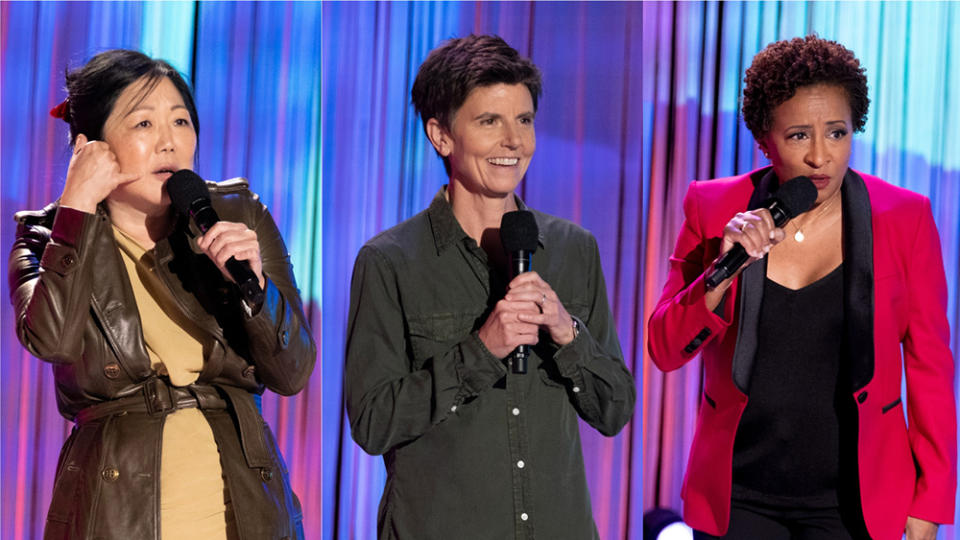
Beth Dubber/Netflix
Eddie has been totally reshaping comedy for decades. Dressed to Kill was so powerful and so bold and coming out on that stage, she just destroyed it. People haven’t seen Eddie in a while, and I don’t think a lot of audiences have seen Eddie since she transitioned. Then there’s someone like Marsha Warfield, who we had worked with on a pilot for BET. She’s so funny, but she came out later in life. I had her do a benefit for the LGBT Center in L.A. and she came out on stage and did all this great queer material. We don’t see many older women of color talking on stage about coming out later in life and about being sexual beings — that they’re not just “fossils.” On top of that, she’s one of the best to ever do stand-up.
LGBTQ+ comedians, like other comedians from certain groups, can have their work boiled down to “gay jokes” or “trans jokes,” but their sets can be and are more topically diverse, a reality the Stand Out special reflects. Was this something you were consciously thinking about when selecting talent?
People talk about diversity and I think it can mean certain things to certain people. These days, it has become a word that’s thrown around. But I think if you really understand the concept, I think queer comedy is the perfect place to express it. Because it’s the celebration of difference and it’s not just what someone looks like. It’s what they’re saying. It’s how they say it. It’s how they perform it. That’s why I wanted to do something about queer comedy. You see Bob the Drag Queen come out — so hilariously funny, and completely different than Tig Notaro, who’s completely different from Scott Thompson, who’s completely different from Wanda Sykes. That’s diversity and that’s what that night was and what this project is. It’s a celebration of what we do with the art form and how we do it differently than any other group of people.
Comedy’s been such an important part of our community and, I think, an agent for change because of that. I did a great interview with Fortune Feimster for the doc and I asked her, “Do you consider yourself an activist?” She said, “No,” but then she started thinking about it. She said, “Well, actually, I do realize the fact that I’m selling out theaters in places like Alabama, Arkansas and Iowa and I’m talking about my wife.” While she may not be talking about Trump and politics, there’s the fact that she’s on those stages and talking about her wife and about their lives together on tour in the South and the Midwest. She’s like, “I recognize that that is probably pretty subversive in its own way and if I can change hearts and minds from doing stand-up — from just talking about my life in these towns and cities where people don’t really get to hear about the life of a lesbian woman — then yeah, I guess I’m an activist.” That’s how I see it, too.
That can be tricky for comedians or other artistic talents from historically excluded groups. There’s sometimes a fear that just doing something as you are means you have to be speaking for someone when instead you just want to be recognized as doing what other people are doing.
I always joke — and I’m sure you’ve heard this, too — we’ll know when we’ve made it when we can be mediocre. When we can have a mediocre hack arena comic then we’ve made it. Sometimes people can get very precious about like don’t call me a female comedian. Don’t call me a queer comedian. Don’t call me a Black comedian, an Asian comedian. I get it, but sometimes we don’t get to choose. So rather than looking at it as a pejorative, I always say look at it as a badge of honor. Because thank God we have female comedians. Thank God we have queer comedians. Thank God we have Black comedians. For so many people, they are looking for themselves. They are looking for their experiences. They are looking for validation or a lifeline. So being out on that stage and identifying as a queer comedian or comedian who’s queer is hugely important. We need that representation. We need our voices heard. So it’s important and I hear what people are saying about “I’m doing exactly what they’re doing,” but you’re not. We don’t have the majority of comedy specials and TV shows. It’s not commonplace. It’s not mediocre. We’re not that successful yet.
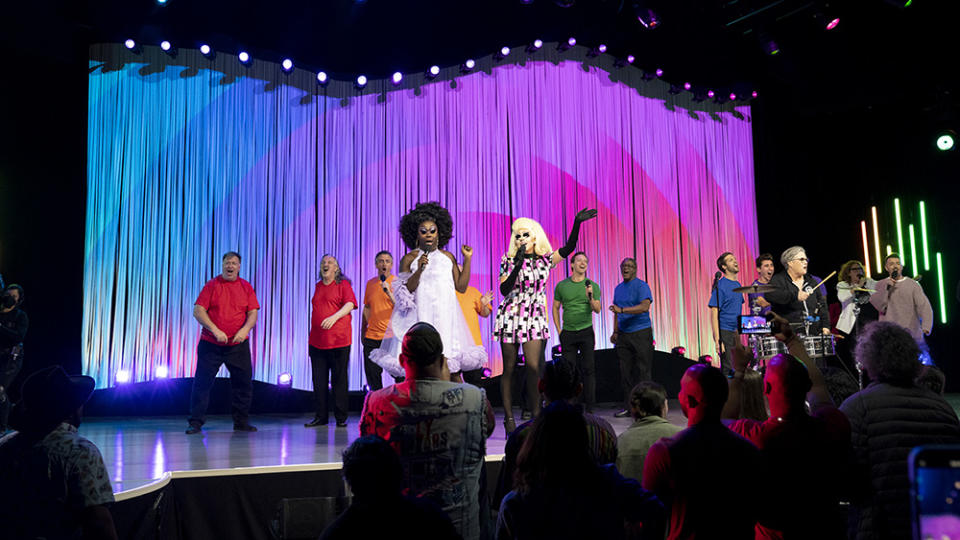
Beth Dubber/Netflix
You had a lot of talent and a lot of material. The special reflects some but not all of it. What were the challenges of having to edit this down, especially with such a quick turnaround?
If I had my way, this special would be much longer. I do not get to decide that because there’s something called an algorithm that’s very important, apparently. (Laughs.) So it was a three-hour live show that had to be cut down to 90 minutes. That’s never fun, but I think it becomes a challenge especially when you have a really short turnaround. Normally, we’d have eight weeks, 10 weeks, for a 90-minute show. We usually have a lot longer to spend time with it and edit it, especially with this number of people. We had about 11 days. So we had to really work quickly but thoughtfully. I always want to try to lead with the funny, so people whose sets were killer from start to finish you don’t really want to touch. Also, part of what I wanted to do with this live show and the special was honor our trailblazers, so I didn’t really want to mess with their sets. Eddie’s set, not a word of it was changed. That was it from start to finish.
So then you mold everybody around that. We had to really look at whose set edits down well. Gina Yashere, for example, told one long story about getting another dog. Luckily, the way she told it there were edit points so it could be shortened. That speaks to Gina’s experience and genius. Then there were other people, if you started to cut out jokes, the set became weaker. It was really a balancing act. That’s why some of the sets are longer, and some of them are shorter. It really ends up being what’s the best version of this set and where it makes sense. Sometimes if you cut one joke you’ve ruined their entire set. It’s hard to do and never fun to edit comedians, but sometimes we have to and hopefully, they trust me enough and feel good about how their sets were ultimately presented.
You didn’t just have an all LGBT+ lineup. You also had a very queer crowd. What was it like to see what you were doing on stage reflected in its audience?
I always assumed the audience would be predominantly gay or queer because it’s all of our comedy heroes on the same stage and that’s never happened and comedy really is such a big part of our community. I’m in Providence Town right now and you walk down the street and there are 10 different comedy shows being advertised. Fire Island has a ton of comedy, San Francisco Castro district has a ton of comedy. If you don’t want to go to a club, you go to a comedy show. We’ve always had that. But it was one thing to just assume it. Then to see it and to feel it? That was a dream come true. Six thousand people at the Greek Theatre. What I also loved is that the audience was diverse. So it wasn’t just one group. It wasn’t all gay men. It wasn’t all cis white lesbians. It was mixed. I think because of what we’ve been through — not just the pandemic, but we’re under attack, again, the same fucking shit but different decade — it was this chance for everyone to coalesce together.
The show was just as much about the people in the seats as it was the people on stage, frankly, and to see the love and see excitement was just pure joy. This is a moment in our culture where we needed to be united as a community. We all throw around the word “pride” — you know, Chase Bank presents the Pride Parade — but it was like everyone felt it. It made me cry. I was watching in the control room, looking at monitors and directing cameras and you see people kissing, people jumping to their feet and shouting. I’ve never seen that for us. That’s the thing I’m most proud of because it just shows us we can do these things. We don’t have to be only in laundromats doing comedy night or being in off-the-beaten-path venues. We can be at the Greek Theatre and we can sell it out.
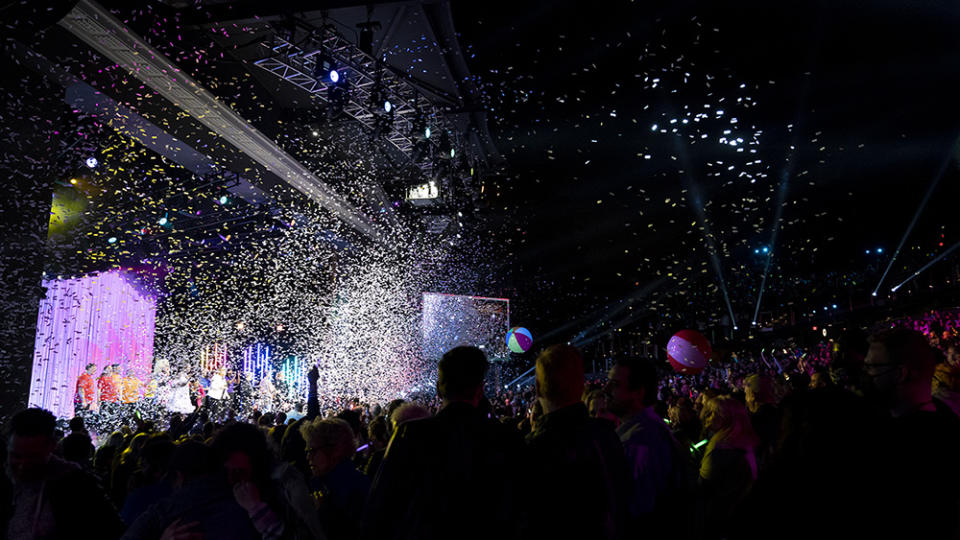
Beth Dubber/Netflix
At the top of the show, Eichner jokes about two things that have been in the news cycle when it comes to live comedy: the Oscars slap and anti-trans sentiment. Many have commented on the fear of violence comedians now face, but the fear of being attacked is something LGBTQIA+ people have faced on and off the stage for a long time. How is the conversation around stage violence different for queer and trans comedians?
It’s a great question because it’s something we queer comedians have faced forever. I had a long talk with Judy Gold, not very recently, about how in the early ’00s and in the ’90s when you got on stage, you had to figure out when you were going to come out and say you were a lesbian, gay, queer, bi or trans. It was terrifying because what would happen is — especially if you were in a mainstream venue — you would just get up there and you would tell your few jokes. You get them on your side, they love you and then all of a sudden you talk about your significant other or you talk about being bisexual and there would be a noticeable shift; arms folded, people sitting back, harder to get laughs. Sometimes people just shouting “Fuck you f—t.”
Scott Thompson talks about how an emcee brought him up on stage by making a joke that Scott had just given him a blow job. So then where are you starting from? You get on that stage and they hate you. So we have experienced that the whole time. In the ’80s during the AIDS crisis and the oppression of Reaganism, being an out gay male comedian was like being a unicorn. That’s why when you think of that generation of gay male headliners, it’s very hard to think of too many. At that time, you had Andrew Dice Clay and Eddie Murphy making jokes about f—ts. So now fast-forward, we’re hearing huge comedians making jokes about trans people — hideous jokes. They’re not even funny, frankly. They’re just hack. And the difference is everybody has a gun now. Violence is the answer being promoted by our former president and other people. So the heckles, you worry, are going to be expressed in a different way. In a more violent way.
I had a talk with Mae Martin prior to the show about it. We had increased security. We wanted to make sure that no one could get anywhere near the comedians. It’s definitely something that people have to think about and that’s such a shame. We can deal with hecklers, but it’s hard to deal with somebody with a gun, somebody with a knife, somebody that wants to punch you in the face. It’s a very dangerous time when you have comedy heroes talking about “beating the shit out of a bulld—e” and people falling out of their chairs laughing at that. Or saying terrible things about trans people that aren’t true about glory holes and bathrooms. Just the worst kind of crap. It’s a dangerous time because then people are provoked into action. So it is an added challenge for queer comedians, but they are fearless and they will not be deterred. Ever. No one pulled out of the show. Everyone was like, “I’m in. I will be there and nothing will stop me from being on that stage.” And that’s what we’ve always done.
Best of The Hollywood Reporter

